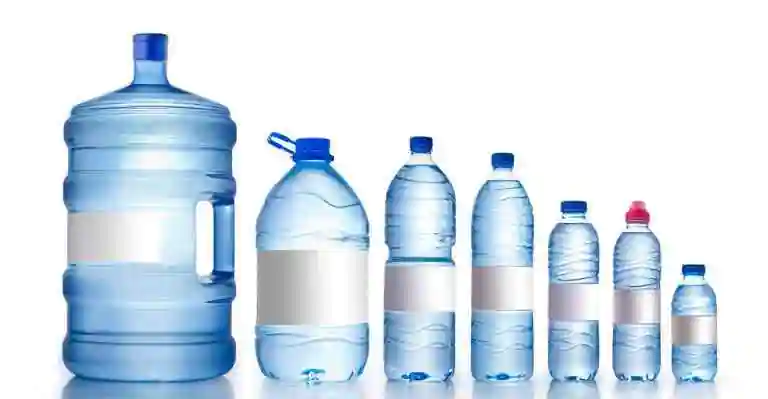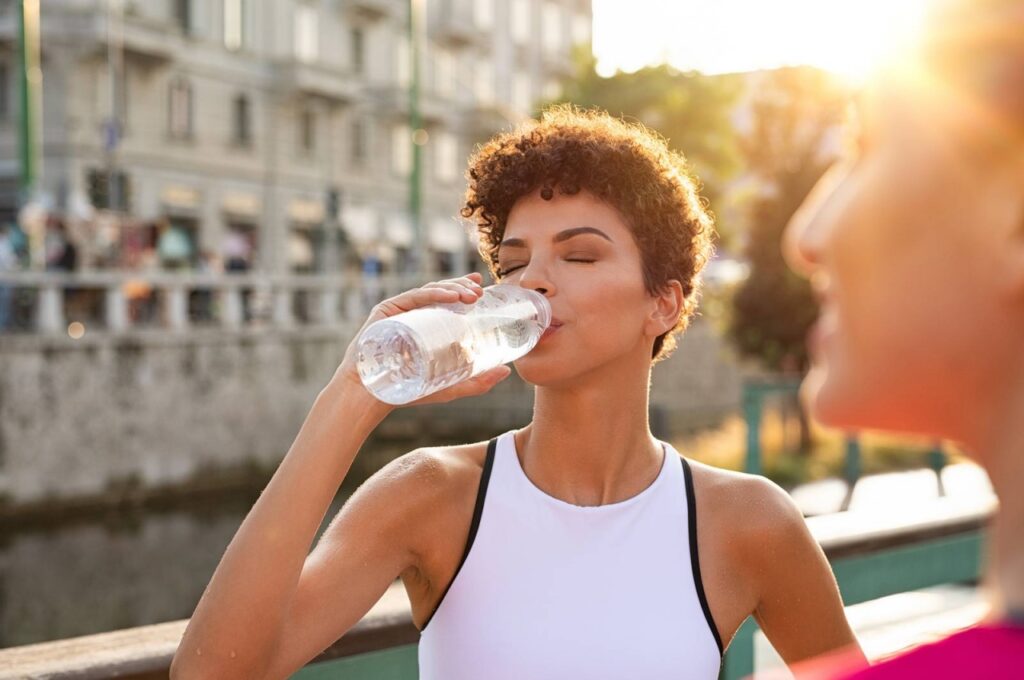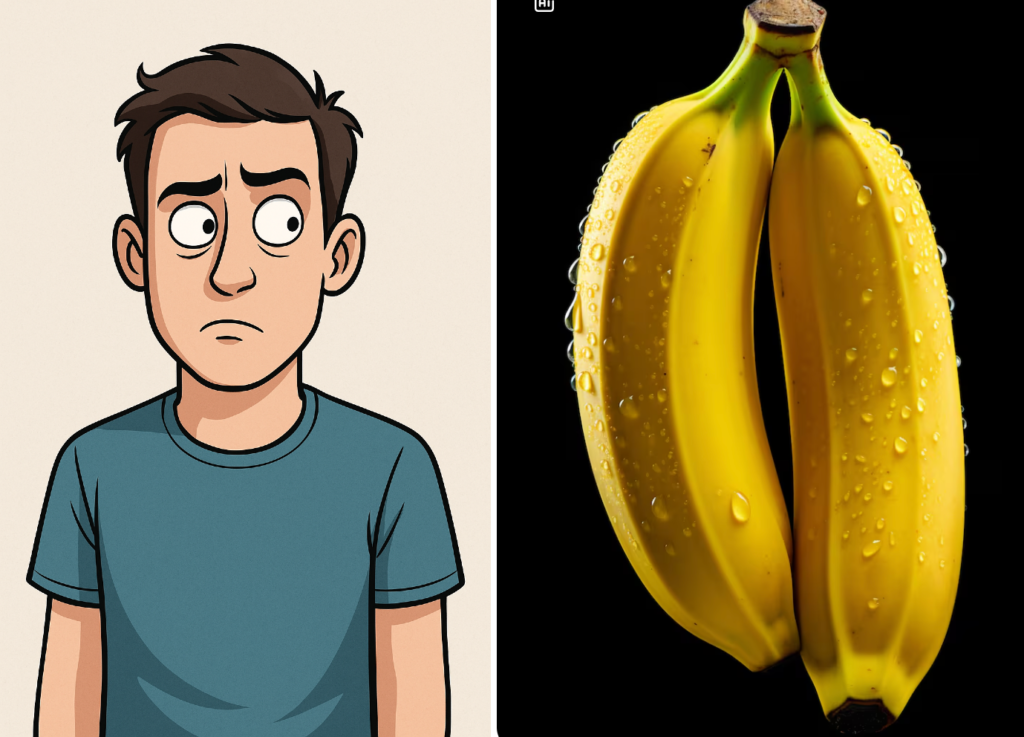Water makes up about 60% of your body. Throughout the day, the body loses water, mostly through urine and sweat, but also through normal body functions like breathing. To avoid dehydration, drink plenty of water and eat plenty of fruits and vegetables every day.
There are many different perspectives on how much water you should drink on a daily basis.
Eight 8-ounce glasses, or about 2 liters, or half a gallon, of water per day, is commonly recommended by health experts. This is known as the 88% rule, and it is very simple to remember.
You may require more water than others. The amount of water you require is also determined by:
Where do you reside? In hot, humid, or dry climates, you’ll need more water. If you live in the mountains or at a high altitude, you’ll need more water.
Your eating habits. You may lose more water through extra urination if you drink a lot of coffee and other caffeinated beverages. If you eat a lot of salty, spicy, or sugary foods, you’ll probably need to drink more water. If you don’t eat a lot of hydrating foods that are high in water, such as fresh or cooked fruits and vegetables, you may need to drink more water.
The season or the temperature. Perspiration may require more water in warmer months than in cooler months.
Your surroundings. You may become thirstier more quickly if you spend more time outside in the sun or in hot temperatures, or in a heated room.

Water Intake Depends upon Total Activity
What level of activity do you have. You’ll need more water than someone who sits at a desk if you’re active during the day or walk or stand a lot. If you work out or do anything else that makes you sweat a lot, you will need to drink more to make up for the water you lose.
Your well-being. You will need to drink more water if you have an infection or a fever, or if you lose fluids through vomiting or diarrhoea. You will also require more water if you have a health condition such as diabetes. Some medications, such as diuretics, can cause you to lose water as well.
Whether you’re expecting a child or you’re nursing a baby. You’ll need to drink more water to stay hydrated if you’re pregnant or nursing your baby. After all, your body is working for two (or more) people.
Finally, It’s Your health, activity, and environment all influence how much water you need to stay healthy.
Is there a link between water intake and energy levels and brain function?
Many people believe that if you don’t drink enough water throughout the day, your energy and brain function will suffer.
There are numerous studies to back this up.
A study of women found that a 1.36 per cent fluid loss after exercise lowered mood and concentration and increased headache frequency.
Another study in China followed 12 university-aged men for 36 hours and discovered that not drinking water had a noticeable impact on fatigue, attention and focus, reaction speed, and short-term memory.
Dehydration, even mild dehydration, can have a negative impact on physical performance. A clinical study of older, healthy men found that even a 1% loss of body water lowered muscle strength, power, and endurance,
Although losing 1% of your body weight may not seem like much, it is a significant amount of water. This usually occurs when you’re sweating profusely or in a very hot environment, and you’re not drinking enough water.
Hence, mild dehydration brought on by exercise or heat can have a negative impact on your physical and mental abilities.
Is it true that drinking a lot of water aids weight loss?

Many people believe that increasing your metabolism and curbing your appetite by drinking more water will help you lose weight.
Drinking more water than usual was linked to lower body weight and body composition scores, according to a study.
Chronic dehydration was linked to obesity, diabetes, cancer, and cardiovascular disease in another review of studies.
Drinking 68 ounces (2 liters) of water in one day increased energy expenditure by about 23 calories per day, according to a previous study, due to a thermogenic response, or faster metabolism. The amount was small at first, but it could grow over time.
Drinking water about half an hour before meals can also help you consume fewer calories. This could occur because the body is prone to mistaking thirst for hunger.
People who drank 17 ounces (500 mL) of water before each meal lost 44 percent more weight over 12 weeks than those who didn’t, according to one study.
Overall, it appears that drinking enough water, especially before meals, can help you manage your appetite and maintain a healthy body weight, especially when combined with a healthy eating plan.
Furthermore, drinking plenty of water has a slew of health advantages.
Drinking water about a half hour before each meal can help you eat fewer calories by causing slight, temporary increases in metabolism.
Finally, for some people, both of these effects can help them lose weight.
Is drinking more water beneficial to one’s health?
In order for your body to function properly, you must drink enough water. Increased water intake may also help with a variety of health issues:
Constipation. Constipation is a common problem that can be alleviated by increasing water intake.
Infections of the urinary tract. Increased water consumption has been shown in recent studies to help prevent recurrent urinary tract and bladder infections.
Stones in the kidneys. A previous study found that drinking a lot of water reduced the risk of kidney stones.
Hydration of the skin. More water leads to better skin hydration, according to studies, though more research on improved clarity and acne effects is needed.
Finally, drinking more water and staying hydrated can help with constipation, urinary and bladder infections, kidney stones, and skin dehydration, among other issues.
Do other liquids contribute to your total?
Water isn’t the only beverage that helps you maintain a healthy fluid balance. Other beverages and foods can have a big impact.
Caffeinated beverages, such as coffee or tea, are thought to dehydrate you because caffeine is a diuretic.
In fact, studies show that these beverages have a minor diuretic effect, but they can cause excessive urination in some people. Even caffeinated drinks, on the other hand, help your body retain water.
Water is present in most foods in varying amounts. Water is found in meat, fish, eggs, and, especially, fruits and vegetables.
Coffee or tea, along with water-rich foods, can help you keep your fluid balance.
Finally, because the body has an automatic thirst signal, most people don’t need to think too hard about their water intake. Certain circumstances, however, necessitate paying closer attention to how much water you consume.
Maintaining a healthy water balance is critical for survival.
As a result, your body has developed a sophisticated system for regulating how much and when you drink. Thirst occurs when your total water content falls below a certain threshold.
This is kept in check by mechanisms similar to breathing, so you don’t have to think about it.
Your body understands how to maintain a healthy water balance and when to urge you to drink more.
While thirst is a good indicator of dehydration, feeling thirsty alone may not be enough for optimal health or exercise performance.
You may already be experiencing the effects of dehydration, such as fatigue or headaches, when thirst strikes.
It’s easier to tell if you’re drinking enough by looking at the color of your urine (21). The urine should be pale and clear.
The 8/8 rule isn’t based on any science. It’s completely random. However, certain circumstances may necessitate increased water consumption.
The most important one could be when you’re sweating a lot. This includes physical activity and hot weather, which is especially important in a dry climate.
If you sweat a lot, make sure to drink plenty of water to replace the fluid you’ve lost. In addition to water, athletes who do long, hard workouts may need electrolytes like sodium and other minerals.
When you have a fever, vomiting, or diarrhea, you need to drink more water. If you want to lose weight, you should also increase your water intake.
Furthermore, older people may need to be more conscious of their water intake as their thirst mechanisms begin to fail as they age. Adults over the age of 65 are at a higher risk of dehydration, according to studies.
Most people don’t need to think about their water intake because their bodies do it for them.
During pregnancy and breastfeeding, your need for water increases.

Pregnant women should drink ten 8-ounce glasses of water per day, according to the Institute of Medicine. When you’re breastfeeding, you should increase your daily intake to thirteen 8-ounce glasses.
The 8-ounce rule for daily water intake is well-known to most people: eight 8-ounce glasses of water per day. However, your body requires more fluids during pregnancy in order to produce extra blood and amniotic fluid.
Furthermore, if you live above 1,500 meters (4,900 feet), lower humidity means you lose more water than usual through sweat and respiration, making it even more important to stay hydrated.
How much water should you drink on a daily basis?
The importance of water in one’s health cannot be overstated. Are you getting enough of what you need? These guidelines can assist you in determining this.
Staff at the Mayo Clinic
How much water should you consume on a daily basis? It’s a straightforward question with no simple answer.
Over the years, various studies have resulted in varying recommendations. However, your specific water requirements are determined by a variety of factors, including your health, level of activity, and location.
There is no one-size-fits-all solution. Knowing more about your body’s fluid requirements, on the other hand, will help you estimate how much water you should drink each day.
Although excessive amounts of water have been known to have negative effects, there is currently no set upper limit for water intake.
The National Health Service (NHS) in the United Kingdom recommends drinking 6 to 8 glasses of water per day, or 1.9 litres (almost 34 fl0.oz), including water from food. This amount is suitable for a temperate climate, they say. They claim that in hotter climates, more will be required.
What are the health advantages of drinking water?
Water makes up about half to seventy percent of your body weight and is the most important chemical component. The survival of your body is reliant on water.
Water is required for the proper functioning of every cell, tissue, and organ in your body. Take, for instance, water:
- Wastes are eliminated through urination, sweating, and bowel movements.
- Maintains a healthy body temperature.
- Joints are lubricated and cushioned.
- It safeguards delicate tissues.
What is dehydration?
Dehydration is a condition that occurs when your body does not have enough water to carry out normal functions due to a lack of water. It, even mild dehydration, can sap your energy and leave you exhausted.
On the other hand, dehydration occurs when a person’s body weight drops by 3% as a result of fluid loss in older children and adults. When the weight drops by 6%, it is considered moderate dehydration, and when it drops by 9%, it is considered severe dehydration.
How much water will you require to avoid dehydration?
You lose water every day through your breath, sweat, urine, and bowel movements. You must replenish your body’s water supply by consuming water-containing beverages and foods in order for it to function properly.
So, how much fluid does a normal, healthy adult in a temperate climate require? The National Academies of Sciences, Engineering, and Medicine in the United States say that a good amount of fluid to drink every day is:
- Men should drink about 15.5 cups (3.7 liters) of fluid per day.
- Women should drink about 11.5 cups (2.7 liters) of fluid per day.
- These guidelines apply to fluids such as water, other beverages, and food. Food accounts for about 20% of daily fluid intake, with the rest coming from drinks.
It’s impossible to define an ideal intake because it varies so much depending on:
environmental conditions of activity
Individual factors include body mass, sex, and age, as well as health status, such as poor kidney function and the use of diuretics.
whether or not a woman is pregnant or lactating
Recommendations that a person drinks eight glasses of water per day ignore the fact that a large portion of our fluid intake comes from food and other beverages.
What about the recommendation to drink eight glasses of water per day?
You’ve probably heard that drinking eight glasses of water a day is a good idea. It’s a simple goal to remember, and it’s a reasonable one.
The majority of healthy people can keep themselves hydrated by drinking water and other fluids whenever they are thirsty. For some people, less than eight glasses per day may be sufficient. Others, on the other hand, may require more.
Although there is little scientific evidence to support this, it is commonly stated that we should drink at least eight glasses of water per day.
“Not only is there no scientific evidence that we need that much water, but the [8 by 8] recommendation could be harmful, both in terms of potentially dangerous hyponatremia and pollution exposure, as well as in terms of making many people feel guilty for not drinking enough.”
Some experts, however, believe that you should drink water constantly throughout the day, even if you aren’t thirsty.
This, like so many other things, is dependent on the individual. The amount of water you require is influenced by a variety of factors (both internal and external).

Several factors may require you to adjust your total fluid intake:
Exercise. If you engage in any activity that causes you to sweat, you should drink plenty of water to compensate for the fluid loss. Water should be consumed before, during, and after a workout.
Environment. Sweating is a natural reaction to hot or humid weather, and it necessitates more fluid intake. High altitudes can also cause dehydration.
Overall well-being. When you have a fever, vomiting, or diarrhoea, your body loses fluids. Drink more water or take oral rehydration solutions as directed by your doctor. Bladder infections and urinary tract stones are two other conditions that may necessitate increased fluid intake.
Breastfeeding and pregnancy If you’re pregnant or nursing, you might need to drink more fluids to stay hydrated.
Is drinking water the only way to stay hydrated?
No. You don’t have to rely solely on the water to keep hydrated. A significant portion of your diet is also provided by what you eat. Many fruits and vegetables, such as watermelon and spinach, are almost entirely made up of water.
Water also makes up the majority of beverages like milk, juice, and herbal teas. Even caffeinated beverages, such as coffee and soda, can help you meet your daily water requirements. However, limit your intake of sugar-sweetened beverages. Regular soda, energy or sports drinks, and other sweet drinks often have a lot of added sugar, which can provide more calories than necessary.
How do I know when I’ve had enough to drink?
If you’re drinking enough water, you’re probably fine.
You are rarely thirsty.
Your urine is clear or light yellow in colour.
Your doctor or dietitian can help you figure out how much water you should drink each day.
Make water your beverage of choice to avoid dehydration and ensure your body receives the fluids it requires. Drinking a glass of water is a good idea:
Between meals and with each meal
Before, during, and after physical activity
Should I be concerned about drinking too much water if I’m thirsty?
For healthy, well-nourished adults, drinking too much water is rarely a problem. Athletes may drink too much water to keep from getting dehydrated when they work out for a long time or hard. Your kidneys can’t get rid of excess water if you drink too much water. Your blood’s sodium content becomes diluted. This is known as hyponatremia, and it can be fatal.
Quick facts about water consumption
The main source of water in our bodies is food and fluids, including water.
The recommendation to drink eight 8-ounce glasses of water per day is not supported by research.
Individual needs and circumstances, such as activity and climate, determine how much water we require.
The thirst mechanism tells us when we need more fluid, and the healthy body naturally maintains a well-tuned fluid balance.

Intake recommendations based on age
Although there is no set amount of fluid recommended for each age group, some patterns emerge among healthy people who engage in moderate physical activity in a temperate climate.
The average water intake of infants and adults is shown below:
age bracket
Infants’ average daily fluid intake
Breast or bottled milk, ranging from 525 ml for a 3.5-kilo newborn to 1,200 ml for an 8-kilo infant per day
Adults aged 19 to 30 years consume an average of 3.7 liters per day for men and 2.7 liters per day for women, depending on the climate, activity, pregnancy status, and overall health.
Infants
Until the age of around 6 months, an infant consumes an average of 780 (ml), or just over 26 fl oz, of breast milk or formula milk per day. Plain water is not recommended before the age of 6 months.
This can range from around 525 ml (just under 18 fl oz) per day for a 3.5-kilo newborn to 1,200 ml (45 fl oz) per day for an 8-kilo infant at 6 months, or around 150 ml (5 fl oz) per kilo of weight per day for an 8-kilo infant at 6 months. This is significantly more than an adult requires. When babies start eating solid foods, they need less fluid from breast milk and formula.
Children over the age of 12 months should be encouraged to drink more water, for these are considered growth ages, and at this age children are hyperactive. To stay well-hydrated, you must drink a lot of water. when the weather is warm as an alternative to sweetened drinks and juices as part of the daily routine, for example, after brushing teeth and before, during, and after playtime at school, etc.
One glass of juice per day should be considered the minimum intake in such a case. To encourage healthy water-drinking habits, parents should keep a pitcher on hand, and schools should have water fountains or similar facilities.
Children suffering from a fever
Dehydration is a condition that occurs when a child’s body temperature falls below a certain level.
For example, if you have a fever, the CDC recommends that you do the following:
For up to a year-3 mugs
From one to three years-4 mugs
4–8 years old-5 mugs
Ages 6 to 13-8 mugs
14 and up 11 to 13 cups for males and 8 to 9 cups for females
It is critical to seek medical attention if a child is sick with a fever. To maintain an adequate electrolyte balance, a doctor may prescribe an oral rehydration solution.
Adults between the ages of 19 and 30
According to the CDC, between 2005 and 2010, young people in the United States drank an average of 0.45 liters (15 fl oz) of water per day, while adults drank an average of 1.2 liters (39 fl oz).
For most adults between the ages of 19 and 30, the recommended daily total water intake from all sources is:
For men, 3.7 liters (approximately 130 fl oz)
2.7 liters (approximately 95 fl oz) for females
According to one source, a man’s needs can vary from 2.5 liters (84.5 fl oz) if sedentary to up to 6 liters (203 fl oz) if active and living in a hot climate.
Because of their smaller body mass, women’s requirements will likely be 0.5 to 1 liter (17 to 34 fl oz).lower than men’s.
Women will need an extra 0.3 liters (10 fl oz) during pregnancy and an additional 0.7 to 1.1 liters (23 to 37 fl oz) while breastfeeding.
Foods with high water content
In pure water, water accounts for 90-99% of the water.
Milk without fat, tea, coffee, juicy fruits like strawberries and cantaloupes, and vegetables like lettuce, celery, and spinach are all good choices. and have a water content between 80 and 89 percent
70-79 percent of water content in fruit juice, yogurt, fruits like apples, pears, and oranges, vegetables like carrots, and cooked broccoli
Cottage and ricotta cheeses, bananas, avocados, and baked potatoes contain 60 percent to 69 percent of water.
Pasta, beans, peas, salmon, chicken breasts, and ice cream are all good options. have approximately 30 to 39 percent of water content.
Cheddar cheese, bagels, and bread have less water content about 1 to 9 percent
Nuts, chocolate cookies, crackers, and cereals are without any significant water content ie. zero percent

Is it better to drink tap or bottled water?
Both bottled and tap water hydrate the body equally well.
Water from a bottle or from the tap is equally effective at hydrating the body. In terms of hydration, studies in the United Kingdom have found no significant difference between the two drinks.
Mineral waters contain varying amounts of minerals depending on where they come from, but this isn’t a big deal because most minerals come from other foods.
How about some coffee?
Caffeinated beverages are thought to dehydrate rather than hydrate us because they have a diuretic effect on our water balance.
Tea and coffee are good sources of water and do not cause dehydration, according to a number of studies on how caffeinated fluids affect hydration.
A study of 18 healthy male adults found no significant differences in hydration after a variety of caffeinated, non-caffeinated, caloric, and non-caloric drinks, as measured by body weight, urine, and blood tests.
The researchers state, “Advising people to disregard caffeinated beverages as part of their daily fluid intake is not substantiated.”
According to another source, there is “no evidence of dehydration with moderate daily coffee consumption.”
The advantages of drinking water
Water is a vital component of the human body.
- It protects the spinal cord and other sensitive tissues by regulating temperature and lubricating joints and bones.
- eliminates toxins from the body.
Benefits in the short term
Dehydration can be avoided by drinking plenty of fluids, including water.
The following are some of the short-term symptoms of severe dehydration:
- muddled thinking
- a shift in mood
- overheating, thirsty, and a dry mouth exhaustion dizziness headache
- mouth, eyes, and lips are dry
- urinating less frequently than usual
- Organ damage, coma, and death can all result from overheating.
The CDC advises people to drink plenty of water before, during, and after physical activity, especially if it takes place in a hot climate. This can help you stay alert and productive.
In a hot environment, one 8-ounce cup every 15-20 minutes is recommended but not more than 48 ounces in one hour, as this can cause hyponatremia or a low sodium level.
Water is a great way to stay hydrated without adding calories or your dental health. In moderation, sports drinks can be beneficial, but too many will add unnecessary sugar to the body.
Benefits in the long-term
Long-term benefits of drinking water, according to studies, may include a reduced risk of:
Colorectal cancer and cancers of the urinary system
A disease of the heart
Infections of the urinary tract
Constipation and kidney stones
High blood pressure or stroke
However, a variety of other factors influence the potential long-term benefits.
Furthermore, even those with a lower risk of these conditions drank less than eight 8-ounce glasses of water per day.
Loss of weight
If a person “preloads” with water before a meal, it may also help with weight loss. This may assist them in feeling fuller more quickly during meals. They consume fewer calories when they choose water over sweetened juice or soda.
In a study of 318 obese or overweight people who switched from sugary drinks to plain water, they lost an average of 2 to 2.5 percent of their weight. However, rather than water, this could be explained by a decrease in total calories.
Other possible benefits
Other alleged advantages of drinking more water include the avoidance of:
- migraine\nose bleeds
- depression
- Asthma, high blood pressure
- dry cough acne-prone skin
These claims, however, are backed up by little or no scientific evidence.
Higher water consumption in children has been linked to improved diets, behavior, and overall health.
Substitute for Water-Fluids of the right kind
Water can now be found in a variety of beverages and foods, according to recommendations. These, on the other hand, should be chosen with care.
High-fat, high-sugar, and high-alcohol beverages are harmful to one’s health, and plain water is recommended instead.
Regularly consuming more than one alcoholic beverage per day in women and more than two alcoholic beverages per day in men can cause liver inflammation and injury, as well as increase cancer risk and negatively affect every system of the body.
The CDC is concerned that young people who eat a lot of junk food also drink less water and eat less fresh fruit and vegetables. This can lead to more serious health issues. They also prefer to drink highly sweetened beverages over water.
Only 7% of adults stated that they did not drink any water.
Thirty-six percent said they drank 1 to 3 cups per day, while 35 percent said they drank 4 to 7 cups per day.
Twenty-two percent said they drank eight cups or more of coffee per day.
Those who drank the least water were also less likely to engage in other healthy habits, such as eating fresh fruits and vegetables, according to the study.
People who consume excessive amounts of water while exercising may also be at risk. In the Boston runners survey, nearly 2,000 people were thought to have hyponatremia as a result of excessive fluid consumption, with 90 of them possibly finishing with critical hyponatremia.
Having certain diseases or taking certain medications is also a risk factor. Excessive thirst is a symptom of diabetes, for example. This type of problem can also occur when the kidneys are unable to excrete enough water.
However, scientists believe that an internal mechanism prevents most people from drinking too much water, just as the body can adapt to higher or lower levels of water and can remind us, through thirst, when we need to drink more.

Conclusions:
After all, no one can tell you exactly how much water you require. This is dependent on a number of factors.
Experiment with different options to see what works best for you. Some people may function better with more water than usual, while others will simply have to go to the bathroom more frequently.
There are few scientific methods for determining how much water we require.
The majority of studies have focused on how much people consume, assuming that this figure corresponds to or exceeds our needs. It has no bearing on whether or not a person is properly hydrated.
The amount of water a person uses and loses varies depending on the weather and activities they engage in. Dehydration can be caused by heat, activity, and illnesses like diarrhoea and vomiting.
Most healthy people in temperate climates consume enough fluid to stay healthy while going about their daily activities, with food accounting for about a fifth to a quarter of this. When there is a deficiency, the body usually regulates these requirements.
Those who work outside or exercise in a hot climate, on the other hand, will not be able to get all of their water from food.
These guidelines should apply to the majority of people if you want to keep things simple:
Drink enough water throughout the day to achieve clear, pale urine.
Drink when you’re thirsty.
Make sure to drink enough to compensate for lost or extra needed fluids during high heat and exercise, as well as other indications.
That concludes our discussion.
Note: Contact our Writers at www.eastsidewriters.com for writing Blogs/Articles on any niche. We have experts in various domains from Technology to Finance and from Spirituality to Lifestyle and Entertainment.
Originally posted 2021-08-14 14:06:50.







Pingback: The 10 Biggest Weight Loss Myths - 2022 - Eastside Writers
Pingback: Great Tips To Lower The Risk Of Diabetes-Induced Dementia - Eastside Writers
Pingback: Ayurveda Teaches How To Love Your Liver And Stay Healthy - Eastside Writers
Pingback: Obtain Relief From Bothersome Constipation With Natural Treatments
Pingback: Bad Lifestyle-The Reason For Your Liver Dysfunction Leading to Liver Cirrhosis - Eastside Writers
Pingback: 14 Best Easy Home Remedies And Care For Your Dry Eyes - Eastside Writers
Pingback: Diarrhea Diet That Helps Stop Diarrhea And Easy Home Treatments - Eastside Writers
Pingback: Beyond Water Retention: Uncovering the Surprising Truths of Diuretics - Eastside Writers
Pingback: Salt Shock: The Impact of Sodium Imbalance on Your Health - Eastside Writers